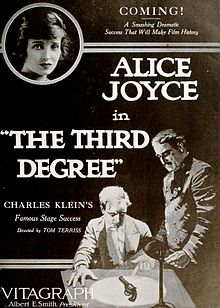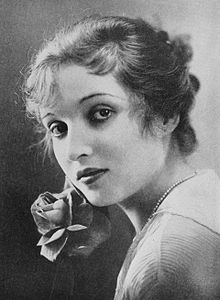The Third Degree (1919 film)
The Third Degree was a 1919 American silent crime drama produced and distributed by the Vitagraph Company of America. It is based on the 1909 play of the same name by Charles Klein.
As described in a film magazine, Howard Jeffries, Sr. Randolf marries again, and the film reveals that the new Mrs. Howard Jeffries, Sr. Hopper and Robert Underwood Evans, the rather fast college roommate of Howard Jeffries, Jr. James, had been more than just friends. Howard Jr. marries Annie Sands Joyce, who had been a lovely waitress in the college town. When the father hears who the bride is, there is a flare up and the young couple leave the house. Underwood opens a curio store, but loses money that does not belong to him. He writes to Mrs. Jeffries, Sr. and says that if she does not come to him, he will shoot himself. Howard Jr. remembers that Underwood owes him some money and goes to collect it, but there gets drunk and passes out on the sofa. Underwood hides him, and Mrs. Jeffries, Sr. arrives and tells Underwood that she will have nothing to do with him. After she leaves, Underwood shoots and kills himself. This sound awakes Howard Jr., who is captured by the police and, under the hypnotic strain of the third degree, confesses to murder. When it is learned that a young woman had called on Underwood, the police try to pin the crime on Annie. She suspects that it was the other Mrs. Jeffries, and gets her to provide evidence to show that it was a suicide, but, to protect her fellow relative, Annie allows the police to believe that she had made the visit. After the trial, Howard, Sr. still wants to end his sons marriage on the sly, but a lawyer who is a family friend convinces Mrs. Jeffries, Sr. to confess to her husband, and the family conflicts are resolved.
Source: Wikipedia


